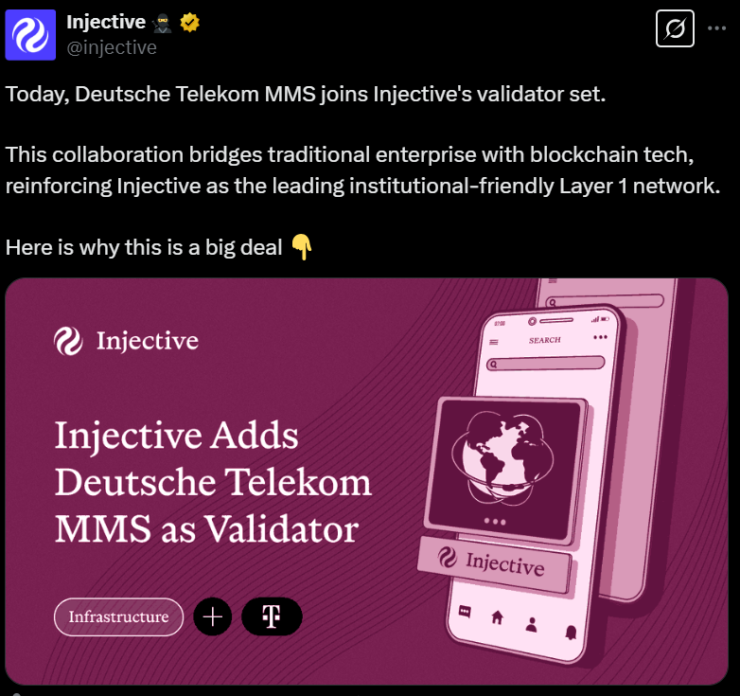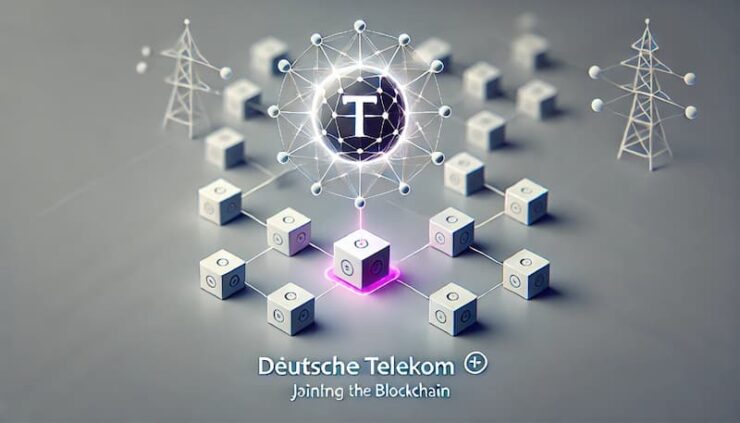In a landmark move signaling the growing institutional embrace of blockchain technology, Deutsche Telekom’s subsidiary, Deutsche Telekom MMS, has officially become a validator for Injective, a layer-1 blockchain built for decentralized finance (DeFi). This development further cements institutional participation in Web3, reinforcing Injective’s security and scalability while demonstrating how traditional telecom giants are integrating into decentralized networks.
Deutsche Telekom’s Expanding Blockchain Footprint
Announced in a February 27 blog post by Injective, Deutsche Telekom MMS will now play a crucial role in validating transactions, securing Injective’s interoperable ecosystem, and participating in on-chain governance. As Injective’s 60th validator, the company joins a growing list of participants that includes major crypto players like Kraken and Binance Staking.

Injective CEO Eric Chen celebrated the move, calling Deutsche Telekom’s participation a major milestone for institutional blockchain adoption.
“This is yet another example of Web3 becoming more and more institutional and fully integrated into a society that understands that a decentralized blockchain offers reliability and security, the importance of which cannot be overstated when dealing with financial matters.”
A Push Toward Institutional Decentralization
Beyond merely validating transactions, Deutsche Telekom MMS is staking Injective’s native token, INJ, to secure the network, propose new blocks, and validate cross-chain interoperability. This aligns with the company’s broader Web3 strategy, as articulated by Oliver Nyderle, head of Web3 infrastructure at Deutsche Telekom MMS, who emphasized the company’s commitment to “fostering true decentralization” and strengthening network security with its robust infrastructure.
This latest blockchain venture is not Deutsche Telekom’s first foray into the crypto space. The telecom giant has steadily increased its Web3 presence over the years:
- Became a Polygon validator in June 2023.
- Became a Celo validator in June 2021.
- Started running a Bitcoin node in 2023.
- Entered Bitcoin mining in November 2023, leveraging surplus renewable energy to power operations.
These moves highlight a clear and deliberate strategy to establish a firm foothold in blockchain validation and digital asset security.
An Institutional-Grade DeFi Blockchain
Injective styles itself as an interoperable layer-1 blockchain optimized for decentralized finance. Operating on a proof-of-stake (PoS) consensus mechanism, it aims to offer high-speed, low-cost financial transactions while facilitating seamless cross-chain interactions.
With Deutsche Telekom MMS now onboard, Injective is further solidifying its reputation as a blockchain trusted by both crypto-native and institutional players. Given that Deutsche Telekom operates in over 50 countries with a market cap of $178 billion and 252 million mobile customers worldwide, its continued expansion into blockchain infrastructure marks a pivotal shift in mainstream adoption.
Corporate Giants Enter Blockchain Validation
Deutsche Telekom’s latest move follows a broader trend of corporate giants integrating into blockchain networks. Just last year, Google Cloud became the central validator for Cronos, joining a pool of 32 others securing the Ethereum Virtual Machine (EVM) protocol.
As more legacy tech and telecom firms move into Web3, it’s evident that the convergence of traditional infrastructure and decentralized technology is accelerating. With increased institutional support, blockchains like Injective could see a new wave of adoption, enhanced security, and mainstream credibility.
What’s Next for Institutional Blockchain Adoption?
With Deutsche Telekom MMS now securing Injective, the blockchain industry is witnessing a paradigm shift one where major corporations are no longer on the sidelines but actively participating in decentralized networks.
As institutional players deepen their involvement, the question isn’t if mainstream adoption will happen but how quickly it will reshape the future of decentralized finance.
Will more telecom and tech giants follow Deutsche Telekom’s lead? If so, the very structure of blockchain validation could evolve to incorporate a hybrid model of decentralization, one that blends institutional infrastructure with grassroots community governance.





